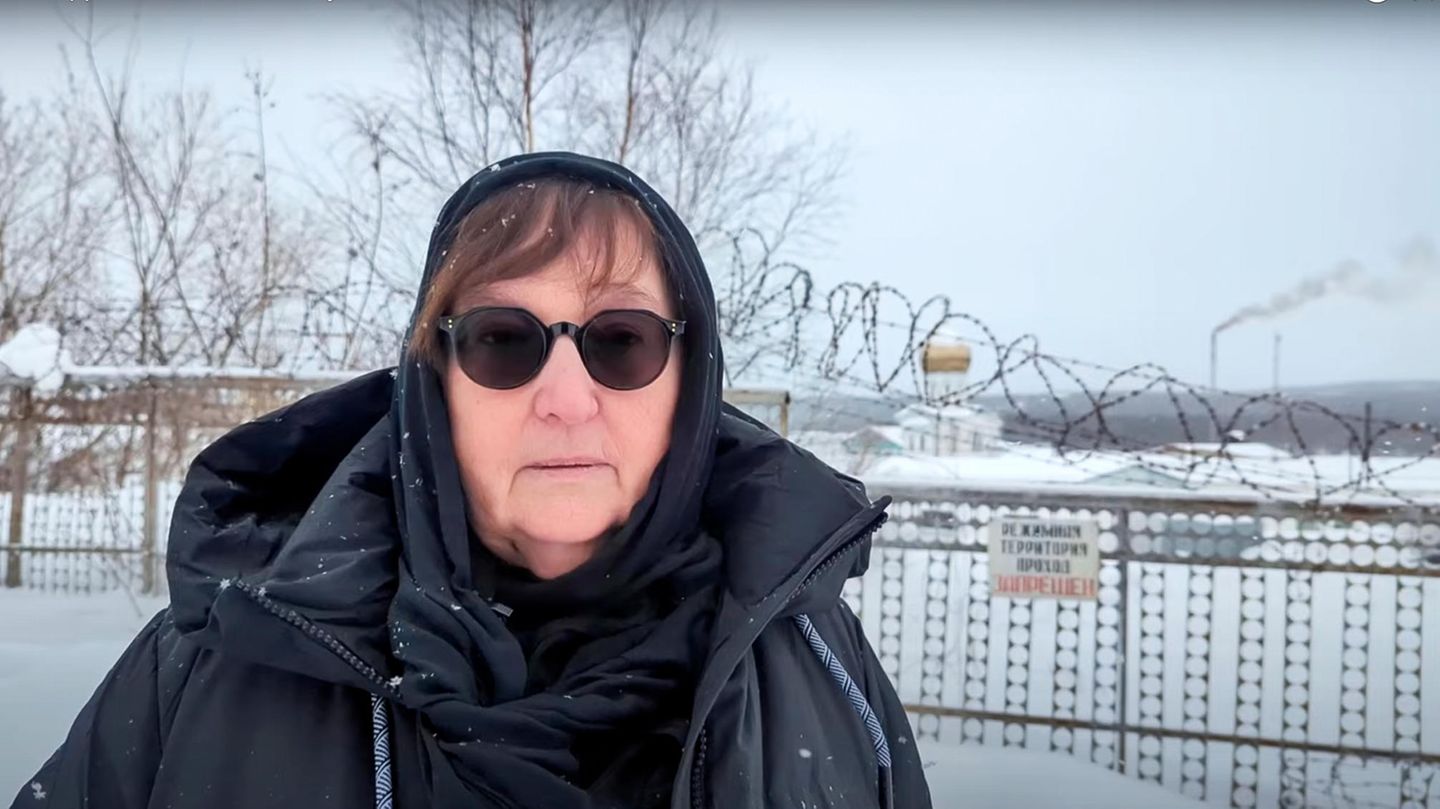Lyudmila Navalnaya, the mother of the dead Kremlin critic Alexei Navalny, has been searching in vain for her son for days. A court will not hear the application to hand over her body until March. The process could drag on for months.
Russian opposition figure Alexei Navalny has been dead for more than five days. But there is still no trace of his body. The mother of the Kremlin critic who died in custody wants to have his body handed over by filing a lawsuit – but the responsible court in the Siberian city of Salekhard does not want to deal with it for another week and a half.
The hearing on Lyudmila Navalnaya’s application has been scheduled for March 4, the Russian state news agency Tass reported on Wednesday. The body has not yet been released and has not been independently examined.
Tass also reported that the court was hearing a lawsuit alleging “illegal acts.” The hearing will take place behind closed doors. According to Navalny’s team, authorities had previously told relatives that the body would remain under lock and key for another two weeks due to “chemical tests.”
Navalny is said to have died of “sudden death syndrome”.
Despite international protests, the authorities are denying relatives any access to Navalny’s body. His team, which accuses the Russian power apparatus of murder, sees this as an attempted cover-up. Russia announced the death of the imprisoned opposition politician on Friday.
According to Navalny’s spokeswoman Kira Jarmisch, the investigative authorities informed the opposition politician’s lawyer on Saturday that the cause of the 47-year-old’s death was still unclear and the body needed to be examined further.
However, there is also other information: According to Navalny’s spokeswoman, before the official announcement of his mother’s death, the authorities had announced that the cause of death was “sudden death syndrome.” This is also reported, citing one of Navalny’s comrades-in-arms. Sudden death or instantaneous death refers to illnesses that lead to an unexpected cardiac arrest resulting in death. State broadcaster RT quoted an unnamed source as saying Navalny died of a blood clot.
The Novaya Gazeta newspaper, which was closed by the authorities in Russia and reopened abroad, reported at the weekend, citing its own sources, that Navalny’s body was being kept in the district hospital in the city of Salekhard. An autopsy had not yet taken place, at least as of Saturday. In addition, the dead man’s body is said to have bruises.
opposition in Russia
Arrested, poisoned, expelled: This is how Putin’s opponents risk their lives
It’s unclear where the body is
The Kremlin-critical Novaya Gazeta quotes an anonymous emergency service employee. The bruises suggested that Navalny had suffered a seizure before his death and was being held by judicial staff. A bruise on the chest is also an indication of actual resuscitation attempts. However, the newspaper report shows that the informant himself did not see Navalny after his death, but was only informed about his condition by colleagues.
There are also doubts as to whether Navalny is actually in the hospital. On Saturday, spokeswoman Jarmisch reported on the X platform (formerly Twitter) that Navalny’s mother and his lawyer had found no trace of the body in the city’s morgue. The morgue was closed and the lawyer had not received a satisfactory response at the contact number posted at the entrance. “He was told he was the seventh caller that day,” Jarmisch wrote. “And Alexei’s body is not in their morgue.”
The independent Russian media also reported on Telegram on Saturday that the forensic medical examination office in Salekhard did not have Navalny’s body. The morgue informed “Astra” that it would not accept bodies from the prison camp.
Alexei Navalny’s mother appeals to Putin
Immediately after Navalny’s death became known, Lyudmila Navalnaya traveled to the IK-3 penal colony in Charp in the Arctic Circle, where her son was imprisoned. However, she has been denied access to his body since her arrival on Saturday. Navalnaya personally asked Russian President Vladimir Putin in a video on Tuesday to be allowed to see and bury her son as quickly as possible.
“I’m turning to you, Vladimir Putin. The decision on the issue depends only on you. Let me finally see my son,” said Lyudmila Navalnaya. She has not yet received the body nor has she been told where the body will be kept. After the short speech by Navalnaya, who was visibly grief-stricken, the Orthodox church on the grounds of the prison camp could be seen in the video behind the barbed wire. According to Russian Orthodox custom, the deceased are actually buried no later than the third day after their death.
The solution to the matter rests solely with the Kremlin chief, Navalnaya said in the video published by Navalny’s organization. “I demand that Alexei’s body be released immediately so that I can bury him in a dignified manner,” she said. Navalny’s widow Yulia Navalnaya also joined the call.
Kremlin chief Putin did not respond to the appeal. Putin has also not yet commented on the death of his most important political opponent.
70,000 Russians sign call for body to be returned
Lawyer Yevgeny Smirnov fears that the investigators would have the opportunity to hide the dead man from the public for a long time. After the first check, criminal proceedings can be initiated in order to carry out further manipulations. “Finding a legal reason to keep the body for months or even longer is very easy,” he said.
Numerous Western politicians blamed the Russian leadership and Putin himself for the death of his prominent opponent. In Russia, more than 70,000 people have already signed an appeal calling for the body to be returned to relatives.
The Russian penal service said Navalny “felt unwell” and collapsed on Friday after being released from prison in his remote penal colony in the Arctic. Attempts by law enforcement officers to resuscitate him were in vain, it said. The reasons for the 47-year-old’s death are being investigated, it said.
Navalny was only 47 at the time of his death, but was weakened by a poison attack in 2020 and repeated solitary confinement in the camp.
Further sources: ,
Source: Stern
I have been working in the news industry for over 6 years, first as a reporter and now as an editor. I have covered politics extensively, and my work has appeared in major newspapers and online news outlets around the world. In addition to my writing, I also contribute regularly to 24 Hours World.




